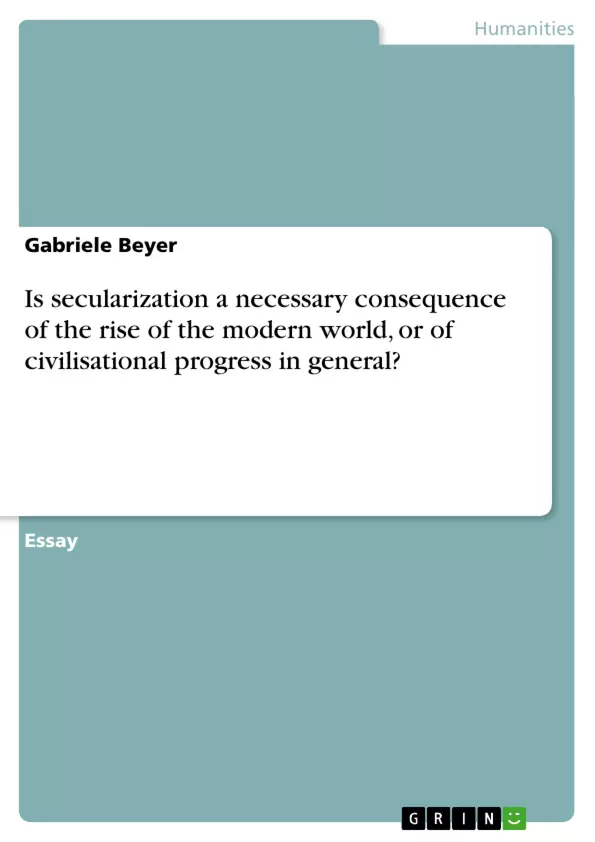In the following essay I want to start with some statistics and graphics, just to have an overview about the topic and about what religious groups and people we are talking, when discussing the problem of secularization.
The next step will be, that I try to define different catchwords using all the time. I’m going to answer questions like: What is meant by secularization? Which effects and historical phases were crucial? How much influence has globalization on the process of secularism? And in the end: does secularization mean, that religion disappear?
To reach the answers, I’m using different attitudes and theses of several authors and compare them with each others. Finally there are two main standpoints: modernization and secularization dues to a displacement of religion and second, religion is changing in social life, but it never loses it impact on people.
Concluding I want to give up my own statement and try to come to a facit.
Inhaltsverzeichnis (Table of Contents)
- Introduction:
- Graphics and statistics:
- Different definitions:
Zielsetzung und Themenschwerpunkte (Objectives and Key Themes)
This essay aims to explore the relationship between secularization and the modern world, examining whether secularization is an inevitable consequence of progress. It does so by analyzing the classical theory of secularization and contemporary arguments surrounding "desecularization" or "re-sacralization."
- Defining secularization and its historical development.
- Exploring the influence of globalization on secularism.
- Analyzing the relationship between modernization and secularization.
- Evaluating whether secularization leads to the disappearance of religion.
- Examining the concept of "resacralization" and its implications.
Zusammenfassung der Kapitel (Chapter Summaries)
The essay begins by providing a statistical overview of religious demographics in Ireland and globally, highlighting the prevalence of Christianity worldwide. It then examines the trends of church membership decline in Germany, particularly focusing on the rate of people leaving denominations. The essay proceeds to offer definitions of the sociology of religion, secularism, and resacralization, providing context for the subsequent discussion.
Schlüsselwörter (Keywords)
This essay focuses on the concepts of secularization, modernization, and resacralization. It examines the sociological study of religion, its historical development, and its relationship to social and cultural change. Additionally, it explores the role of globalization in shaping religious trends and the enduring influence of religion in society.
Frequently Asked Questions
Is secularization an inevitable result of modernization?
The essay explores this debate, contrasting the theory that religion disappears with the idea that it simply changes its form in social life.
What is meant by "resacralization"?
It refers to the return or renewed importance of religious and sacred elements in societies that were previously becoming more secular.
How does globalization affect secularism?
Globalization can spread secular values but also trigger religious movements as people seek identity in a rapidly changing world.
Does religion disappear in modern societies?
Statistics show a decline in church membership in countries like Germany, but many authors argue that religion maintains its impact on people's private lives.
What are the main historical phases of secularization?
The essay examines crucial periods where scientific progress and political changes shifted the influence of the church to secular institutions.
- Arbeit zitieren
- MA Soziologie Gabriele Beyer (Autor:in), 2011, Is secularization a necessary consequence of the rise of the modern world, or of civilisational progress in general?, München, GRIN Verlag, https://www.grin.com/document/211092



